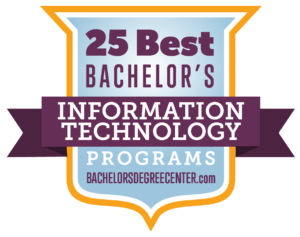
Key Information:
- Purdue University and University of Washington are two top schools for an information technology bachelor’s degree.
- It is important to choose an accredited program from reputable institutions. Accreditation ensures that the education provided meets industry standards, which can be crucial for future employment opportunities.
- Graduates with a Bachelor’s in Information Technology have a wide array of career paths available to them. The degree prepares students for roles such as network administrators, IT managers, cybersecurity analysts, and software developers, among others.
- Online IT degree programs offer flexibility for students who may be working or have other commitments. This accessibility allows students to pursue their education without needing to relocate or attend on-campus classes, making it easier to balance their studies with other responsibilities.
Information technology is such a basic part of contemporary life that we take it for granted; the pocket-sized computers we carry every day were science fiction a generation ago.
For those who do not work directly in IT, it can be easy to forget the immense work that happens in the background of communications, data, and computing. But it takes a massive number of people to make the modern world possible, and an information technology degree can be your entry into that career.
Why Get a Bachelor’s in Information Technology?
There are jobs to fill in IT, and not nearly enough people to fill them — a good position to be in, if you’re an experienced, well-trained information technology professional. The Bureau of Labor Statistics expects the overall job market for IT to continue growing by as much as 11% over the next decade. A plentiful job market also means high pay to attract the best — the average IT salary is over $108,970.
As the 20th century became the 21st, computer science and information technology became obvious candidates for online degree programs, but traditional on-campus learning offers major benefits that online education still cannot.
While online courses can provide a simulation of community, and students can collaborate using online tools (just as they will in real professional settings), on-campus programs are still preferable for those looking for real, one-on-one mentorship.
Traditional programs also provide stronger networking opportunities like internships, workshops, and conferences. That’s why Bachelor’s Degree Center is ranking the 25 Best Bachelor’s in Information Technology Degree Programs.
Methodology: Ranking the Best Bachelor’s in Information Technology Programs
To rank the top Bachelor of Science in Information Technology, Bachelor’s Degree Center editors researched accredited programs with specific IT specializations — preferably ABET-accredited computer science schools. From there, we ranked programs according to five criteria: Cost, Reputation, Alumni Salary, Graduation Rate, and Job Placement.
That cross-section of data, drawn from IPEDS, College Scorecard, and Niche, gives students a fully-rounded, multi-dimensional picture of the programs that will make a real impact on their career, their salary, and their opportunity.
1. Purdue University
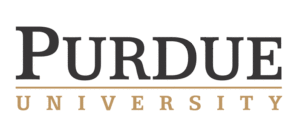
The Purdue University Polytechnic Institute’s BS in Computer Information Technology degree program has received accreditation by ABET — the Accreditation Board for Engineering and Technology. Purdue’s Bachelor of Science in Information Technology program is offered as an on-campus program that prepares students with critical problem-solving skills required to protect data and people in a world that relies heavily on computer technology.
Purdue University’s Computer Information Technology degree is recognized as the fourth-best Bachelor’s in Technology program in the country.
Purdue University is a public institution of higher learning that was established in 1869 as part of the Morrill Land Act. Purdue University was named for the businessman who donated the land and provided the necessary funds required to charter the school. Purdue’s 26,00+-acre large town campus is home to nearly 44,000 students. The school operates with five campuses in and around the West Lafayette.
Degree: BS in Computer Information Technology
Interested? Learn more about the IT degree program here!
2. University of Washington

The University of Washington’s Bachelor of Science in Information Technology degree program comes from the Tacoma School of Engineering & Technology. UW prepares graduates to respond to technological trends and applications through hands-on educational experiences.
The program offers a solitary start date each year, in autumn, and students are encouraged to submit applications early as the bachelor’s in Information Technology program has a limited capacity. ABET — the Accreditation Board for Engineering and Technology accredits The University of Washington’s IT baccalaureate program.
The University of Washington is the flagship institution of higher learning within the six members school of the Washington State system. UDub is a public university that was established in 1861, before Washington was adopted as a state.
Harry the Husky, The University of Washington’s mascot, represents the school’s 46,000+ students. UDub is renowned for its research in the fields of science, medicine, engineering, and computer science, playing a major role in Seattle’s emergence as a tech industry hub.
Degree: BS in Information Technology
Interested? Learn more about the IT degree program here!
3. Rensselaer Polytechnic Institute

Rensselaer Polytechnic Institute’s Bachelor of Science in Information Technology & Web Design program uses an interdisciplinary approach and requires students to complete 128–130 credit units, with 60 credit units focused on the ITWS major.
RPI’s bachelor’s in information technology degree offers degree candidates more than twenty concentrations from which to choose. These include the Web, Artificial Intelligence, Engineering, Arts, Medicine, and Management.
Rensselaer Polytechnic Institute is a research institution of higher learning that was established in 1824. RPI operates with six schools with an emphasis on technology and the sciences. RPI’s main campus is in Troy, NY overlooking the majestic Hudson River in Upstate New York. The school also has branch campuses in Groton & Hartford, CT. The school’s main suburban 250+acre campus is home to nearly 8,000 students.
Degree: BS in Information Technology and Web Science
Interested? Learn more about the IT degree program here!
4. Florida State University
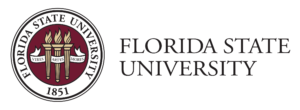
Florida State University’s Bachelor of Science in Information Technology, from the College of Communication & Information/School of Information, offers two concentration majors to select from: Information, Communication & Technology (ICT), or Information Technology (IT).
Each major option requires the completion of 42 credit hours, placed within a typical bachelor degree requirement of 120 credit hours. Coursework includes Website Design, Digital Graphics, Ethics, Communication, Research, Database Skills, and Mobile Application Design, among others. Florida State University’s IT on-campus program has received accreditation from the American Library Association (ALA), an agency dedicated to improving library/information services.
Florida State University was established in 1851 and holds the distinction of being a sea-grant and space-grant state university. FSU ranks among the top 26 public national universities. Florida State University’s several museums combine to create one of the country’s largest university/museums organizations. The school’s 1,600+-acre state capital campus is home to nearly 42,000 students.
Degree: BS in Information Technology
Interested? Learn more about the IT degree program here!
5. Illinois Institute of Technology

The Illinois Institute of Technology’s on-campus Bachelor of Information Technology & Management degree program has been accredited by ABET – the Accreditation Board for Engineering and Technology.
Illinois Tech’s Bachelor of Information Technology program requires each student to select a minor and is encouraged to choose a minor that complements the Bachelor of Information Technology major. The Illinois Institute of Technology allows for up to nine undergraduate credits may be applied to an Illinois Tech graduate degree from the Illinois Institute of Technology.
The Illinois Institute of Technology is a private university that was established in 1890 by a merger between Lewis Institute and Armour Institute. Illinois Tech’s urban campus is home to nearly 7,300 students. The school specializes in science, engineering information technology, business, design, and psychology, among others. The Illinois Institute of Technology spends more than $125 million in research activity each year.
Degree: Bachelor of Information Technology and Management
Interested? Learn more about the IT degree program here!
6. University of South Florida

The College of Engineering offers the University of South Florida’s Bachelor of Science in Information Technology degree program that emphasizes the skills required to succeed in the fields of Web Systems, Programming, Cybersecurity, and Databases, among others.
USF’s bachelor’s in Information Technology degree has received accreditation by ABET — the Accreditation Board for Engineering and Technology. Coursework includes Operating Systems, Computer Design & Architecture, Programming, and Software Concepts, among others. The University of South Florida’s IT degree is denoted as an on-campus program; however, several classes have online options.
The University of South Florida was established in 1956 and is a member school of the State University System of Florida. The school operates from a nearly 2,000—acre campus in the city of Tampa and is home to nearly 51,000 students.
The University of South Florida is recognized among the top 60 public schools in the nation. Their online education program has been recognized as a leader in distance learning.
Degree: BS in Information Technology
Interested? Learn more about the IT degree program here!
7. New Jersey Institute of Technology

The New Jersey Institute of Technology on-campus Bachelor of Science in Information Technology degree program has received accreditation by ABET – the Accreditation Board for Engineering and Technology.
Students graduate prepared to identify, problem-solve, and implement computer-based components and applications in the face of risk. NJIT offers bachelor’s in information technology students an opportunity to amplify their coursework through a Juris Doctor in conjunction with Seton Hall Law.
The New Jersey Institute of Technology is a public university that was established in 1881 as the Newark Technical School. The school’s 48-acre urban campus in Newark NJ is about a half-hour from New York City by New Jersey’s rapid transit systems.
More than 11,000 students study from NJIT’s more than 100 undergraduate and graduate programs. Several New Jersey Institute of Technology programs (i.e. Law and Medicine) partner with nearby Rutgers University and Seton Hall University.
Degree: BS in Information Technology
Interested? Learn more about the IT degree program here!
8. Brigham Young University

Brigham Young University’s Bachelor of Science in Information Technology degree program is accredited by the Accreditation Board for Engineering and Technology (ABET).
The specialty degree requires the completion of 77 credit units, which is a part of the 120 credit units needed to earn a bachelor’s in information technology. Coursework includes Newtonian Mechanics, Web-Based Fundamentals, Cyber-Physical Systems, Digital Forensics, and Embedded Systems, among others.
Brigham Young University is a private research school that is affiliated with the Church of Jesus Christ of Latter-day Saints. BYU was established in 1875 and requires all students to adhere to a strict honor code when earning their degree. Brigham Young University’s 550+-acre suburban campus is home to nearly 34,000 students. The school operates on two nearby campuses and organized among 11 schools/colleges.
Degree: BS in Information Technology
Interested? Learn more about the IT degree program here!
9. Towson University

Towson University’s on-campus Bachelor of Science in Information Technology degree program prepares students with an educational experience that delves into the principles of Technology and their application while maintaining appropriate ethical standards. The bachelor’s in information technology offered by Towson requires the completion of 71–71 credit units in the IT major, with Total Credits required of 122.
Towson University is a member school of the prestigious University System of Maryland. It was established in 1866 as a teacher’s training school. Towson’s suburban campus (8 miles from Baltimore, and a car ride to Washington, DC) serves nearly 23,000 students earning degrees from the school’s eight schools/colleges.
The school is considered one of the largest public institutions of higher learning in the state of Maryland. The school offers a generous transfer credit policy.
Degree: BS in Information Technology
Interested? Learn more about the IT degree program here!
10. Temple University

Temple University’s two on-campus bachelor’s in information technology programs, from the College of Science & Technology, include the Bachelor of Science in Information Technology or a BA in Information Technology degree program that requires the completion of 123 credit units.
Graduates enter the workforce proficient in programming, database management, the web, digital graphics, and systems architecture. Temple’s bachelor’s in Information Technology program includes a capstone project. IT degree holders from Temple are ready to safeguard computer systems through the application of complex technological methods and applications.
Temple University is a state school that was established in 1884 as a private college. It is currently a public university that partners with the state of Pennsylvania. Temple’s 100+-acre main urban campus is home to more than 40,000 students and more than 2,500 full-time faculty members. The school also operates five additional branch facilities throughout the state.
Degree: BA or BS in Information Science and Technology
Interested? Learn more about the IT degree program here!
11. Montclair State University

Montclair State University’s Bachelor of Science in Information Technology degree program prepares graduates to design, implement and maintain computer information systems required by businesses across all sectors, as well as government agencies.
Montclair State University ‘s coursework requires degree candidates to successfully complete 120 credit units to graduate. Required mathematics courses include Calculus A, Applied Statistics, and Discrete Mathematics. Classes include Computer Science Theory, Data Mining, Calculus, Artificial Intelligence, Mobile Computing, and Honors Seminar in Computer Science.
Montclair State University was established in 1908 and is the 2nd largest institution of higher learning in the Garden State of New Jersey. MSU’s students study on the school’s 500-acre suburban campus in Montclair, less than an hour’s drive to New York City via NJ Transit.
The Montclair State University’s first graduating class included the Pulitzer Prize journalist William O. Trapp. Montclair State University offers more than 290 majors, concentrations, and certificates.
Degree: BS in Information Technology
Interested? Learn more about the IT degree program here!
12. Texas Christian University
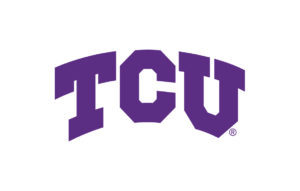
The College of Computer Science and Engineering offers Texas Christian University’s on-campus Bachelor of Science in Computer Information Technology degree program.
Bachelor’s in information technology candidates can select from among three minors — Introduction to Programming, Advanced Systems & Network Administration, or Linux/Unix Systems. Students graduate with the skills required to utilize hardware and software applications to manage database systems or teams of project managers.
Classes include Data Structures, Web Tech, Scripting Fundamental, and Programming, among others. Texas Christian University’s bachelor’s in information technology program requires students to complete 124 credit units to graduate.
Texas Christian University was established in 1873 and is affiliated with the Christian Church. The school’s 300+-acre campus is located a few miles from downtown Fort Worth and is home to nearly 10,500 students. US News recognizes Texas Christian University among the top 100 national universities. Texas Christian University partners with the United State Military, and serves as an ROTC officer training facility.
Degree: BS in Computer Information Technology
Interested? Learn more about the IT degree program here!
13. Marist College

Marist College’s Bachelor of Science in Information Technology and Systems degree program prepares students by providing a comprehensive educational experience in the principles of information systems.
Degree candidates become critical thinkers and problem-solvers in any business, agency, or organization – in any industry! Coursework includes Networks, Web Tech, Data Warehouses, Server Technologies, and Business Intelligence, among others. Graduates find rewarding careers as a Web Developer, Technical Writer, Consultant, or Data Analyst.
Marist College is located about 75 miles north of New York City. The Marist Brothers, a Catholic religious organization, chartered the school in 1929. The school’s 175+ acre main suburban campus is home to more than 6,000 students and overlooks the majestic Hudson River from atop its high east side banks. Marist maintains a branch campus in Florence, Italy.
Degree: BS in Information Technology and Systems
Interested? Learn more about the IT degree program here!
14. East Carolina University
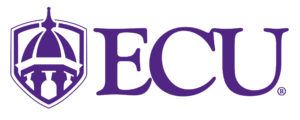
The BS in Information and Computer Technology from East Carolina University is an on-campus degree program that focuses on teaching students the skills they need to handle configuring and maintaining a network and system.
Students also learn hands-on skills that will help with their careers after they complete the program. The focus on ensuring that students are able to handle the complexities of modern technology and the changes that you can expect over time helps you keep up in a competitive field.
East Carolina University stands apart from other programs due to its focus on hands-on experience. With ranking as one of the best regional universities in the South and a reputation for excellence in education for professionals, the on-campus IT program requires students to go through an internship program as part of their degree. That gives students a firm grasp of the skills they need in the workplace and prepares them to handle information technology in a variety of fields.
Degree: BS in Information and Computer Technology
Interested? Learn more about the IT degree program here!
15. Rochester Institute of Technology

The Rochester Institute of Technology on-campus Bachelor of Science in Computer and Information Technologies recognizes the variations in a career based on industries and job opportunities.
That is why the program emphasizes a hands-on strategy as students learn the skills they will need when taking on a new job or career. The program focuses on the various aspects of technology used in modern society and helps students prepare for different types of industries.
The Rochester Institute of Technology differs from other programs because it offers international opportunities for students who want to learn in a different environment. Although the program is an on-campus program, students have opportunities to study at the school’s campuses in Croatia. That means students can continue their IT degree while studying abroad without any changes to their curriculum.
Degree: BS in Computer and Information Technologies
Interested? Learn more about the IT degree program here!
16. University of Tulsa
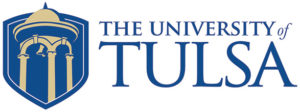
The University of Tulsa’s Bachelor of Science in Information Technology curriculum sets a high standard for students. Students study more than just computer science and basic computing skills.
They will also study advanced mathematics and statistics to ensure that students are able to handle the more complex aspects of information technology and the development of new technologies for future employers. The on-campus program focuses on ensuring that students have the skills to handle challenges that may arise as they move into a career.
The University of Tulsa stands out due to its strong focus on STEM studies. The STEM programs are ABET-accredited and students studying information technology and related STEM fields will meet the high standards set by ABET for accreditation. That gives students a competitive advantage when seeking employment because it assures employers that the students are skilled and capable.
Degree: BS in Information Technology
Interested? Learn more about the IT degree program here!
17. University of Arizona

The University of Arizona BS in Information Science and Technology allows students to focus on accomplishing their goals for their careers. These online and main campus programs recognize that students may have an interest in specific areas of technology.
The three program choices focus on society (BA in information science and eSociety, an on-campus or online program), creative technologies (BA in information science and arts, on-campus only), and intensive computing (BS in information science and technology, on-campus only). Since social media continues to grow and engage the public, the program recognizes that students may need to learn skills associated with online interactions and society as well as the basic skills required for traditional IT jobs.
The University of Arizona stands out from other programs due to their focus on changes within technology and the growth of new ideas. The school recognizes that students will have interests and goals that differ from previous generations. The result in adjustments to the curriculum to reflect the changes in technological advances as well as the opportunities available in the workforce.
Degree: BS in Information Science and Technology
Interested? Learn more about the IT degree program here!
18. La Salle University
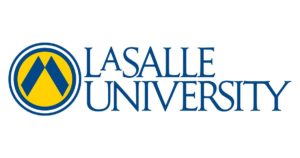
The La Salle University bachelor’s in Information Technology programs are among the best options for students who want the flexibility to choose more than one approach to their degree. The university offers a Bachelor of Arts as well as a Bachelor of Science for information technology. That allows students to focus on the areas of the IT industry that appeal to their interests as well as the career they want to obtain.
La Salle University differs from other programs due to their job placement options. An estimated 90% of students obtain a job in the IT industry through the school’s job placement program. That helps students build their confidence in their potential upon graduation. The high rate of job placement after graduation is a key advantage for new and returning students.
Degree: BA or BS in Information Technology
Interested? Learn more about the IT degree program here!
19. Loyola University Chicago

Loyola University Chicago’s BS in Information Technology prepares students for the growth of the industry. The program recognizes that the explosion of information available through online resources and modern technology is impacting the job market.
That is why the curriculum at the school focuses on teaching students the skills they need to handle the growing interest in technology and modern developments within the IT industry. Students will learn the skills they need to handle the constant changes associated with advances in technology and systems.
Loyola University differs from other schools by focusing on developing effective skills in graduating students. By the time students finish their degree, they are competent and efficient. That allows students to impress potential employers and accomplish the goals they set for their careers.
One of the largest Catholic universities in the US, and a deeply integrated part of life in Chicago, Loyola’s strong connections throughout the city give graduates a leg up on the job market.
Degree: BS in Information Technology
Interested? Learn more about the IT degree program here!
20. Elmhurst College

The Elmhurst College BS in Information Technology is an unusual on-campus degree completion program, using both evening classes and some online classes to help working adults finish their IT bachelor’s degree more conveniently.
Students can transfer credits from a previous college or university. The completion program recognizes that working adults may not be able to attend classes during normal hours, so it offers evening classes to help students finish up a degree while still working or engaging in other obligations.
Elmhurst College stands out due to its focus on providing an environment that helps adults. The school provides completion programs that allow students to take classes and tests in the evening rather than during normal business hours. That allows students to work in a normal career or job while still working on a degree to advance in their job. It opens new doors of opportunity for students who may need to attend classes at odd hours.
Degree: BS in Information Technology
Interested? Learn more about the IT degree program here!
21. Ohio University
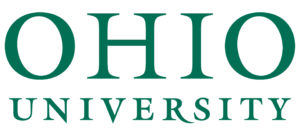
The BS in Information and Telecommunications Systems from Ohio University focuses on the telecommunications aspect of technology and IT networking. Communication via the Internet, phone services, or mobile communication solutions play an essential role in businesses.
Companies need effective telecommunication systems that fit their goals for a growing business. The program at Ohio University recognizes the role of telecommunication in technology and provides an education designed to integrate business with effective technology and proper communication systems.
Ohio University is unique due to its focus on developing useful and unexpected skills in students. By focusing on the skills employers need for their business to grow and thrive, the university is able to encourage students and help them advanced in their career. The program teaches students the skills they need to start a career in a business or corporate environment.
Degree: BS in Information and Telecommunications Systems
Interested? Learn more about the IT degree program here!
22. Saint Mary’s University of Minnesota
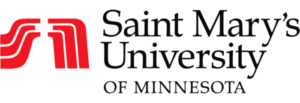
The Bachelor of Science in Information Technology from Saint Mary’s University of Minnesota is an excellent program for developing well-rounded skills. The program focuses on teaching students IT skills that apply to multiple industries and careers.
The well-rounded approach to a student’s education allows students to think of creative solutions when a problem develops. It also ensures that students have more options to address potential problems because they understand multiple situations that may cause a potential complication.
Saint Mary’s University of Minnesota differs from other schools by allowing working adults to transfer credits into the IT program and it gives generous credits based on a student’s previous education and work experience. By recognizing the importance of experience in a career, the school helps students accomplish their goals without wasting time in unnecessary classes.
Degree: BS in Information Technology
Interested? Learn more about the IT degree program here!
23. Ferris State University

Ferris State University’s BS in Computer Information Technology program aligns with industry standards for student education and ensures that students are prepared to handle the challenges of working in the IT industry.
The on-campus program recognizes that students may have unique goals and interests, so students are encouraged to obtain certifications and professional designations to improve their skills and become competitive in the workplace.
Ferris State University is well known for its outreach to working adults and underrepresented students and has frequently ranked as one of the best regional institutions in the Midwest. The ACBSP accredited IT program gives employers confidence in the skills and abilities of students by ensuring that they meet high standards for their skills and abilities. Ferris State goes above and beyond the expectations of employers to make students capable in their chosen careers.
Degree: BS in Computer Information Technology
Interested? Learn more about the IT degree program here!
24. Oakland University

Oakland University’s BS in Information Technology helps students build a strong foundation in their IT skills. The focus on building a strong foundation in the IT industry ensures that students are able to handle unexpected challenges in their careers and jobs.
Information technology changes constantly as new developments impact devices and networking standards. Students need a strong foundation to build their ability to adapt to sudden changes that may occur in their jobs.
The way Oakland University differs from other programs is its focus on a strong foundation and its accreditation. Oakland University is ABET-accredited and meets the high standards for STEM fields. That gives employers confidence in potential employees who graduate from the school, and it helps students learn to accomplish their goals by building on their skills.
Degree: BS in Information Technology
Interested? Learn more about the IT degree program here!
25. Lawrence Technological University
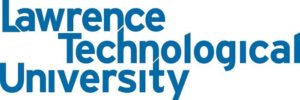
The integration of global industries and technology impacts the career opportunities students have available after graduating.
Lawrence Technical University’s BS in Information Technology program recognizes that IT is a growing field and that employers are looking for professionals who can handle the constant changes associated with the industry. That is why the university focuses on providing students with the skills to work in a global environment.
It also provides the education students need to understand networks, technological advances, and online systems to prepare students to support the needs of an organization or corporate business.
The way Lawrence Technical University differs from other programs is the focus on providing a well-balanced education. The on-campus program recognizes that IT professionals need computing skills as well as managerial and interpersonal skills.
The school takes the time to prepare students for the unique environment they will face after graduating and starting their careers. The university helps students develop useful skills for a modern work environment.
Degree: BS in Information Technology
Interested? Learn more about the IT degree program here!
What Makes a Good IT Bachelor’s Program?
For those who are serious about information technology, pursuing a good IT bachelor’s program can make a big difference as far as an IT career goes. However, potential students will need to find the top-ranked information technology schools that also fit their specific needs and goals.
The best information technology degree is the one that comes from the program that grooms students to do the most in the field and concentration of their choosing. But, to achieve the best information technology degrees, the top-ranked information technology schools must offer the right tools and education modalities. When seeking such a school, applicants will want to make sure the school offers things like:
- Access to advanced labs and facilities
- Career development training and job prospects
- Educational resources beyond the curriculum
- Hands-on learning
- Internships, mentorship, coaching programs
- Paths to specific certifications
Education in IT never stops, since information technology is always moving forward. Innovation often dictates the need for further learning. A good IT bachelor’s program understands these facts and gives students the tools to overcome IT challenges today and tomorrow. The education and opportunities offered at these types of programs are what makes for the best information technology degrees.
In most IT and computer science degree programs, you will learn about:
- software development
- computer network administration
- software engineering
- data analytics
- computer programming languages
- data science
- computer engineering
- systems analysis
- algorithms
Will a Bachelor’s in Information Technology Help Me Make More Money?
One of the most attractive things about IT careers is they don’t necessarily need to start with a degree. Nevertheless, a bachelor’s in information technology salary is certainly a better prospect for those who want to earn more and do more in the IT field. IT degree salary ranges only grow when the job seeker has a bachelor’s degree and are seeking bachelor of information technology jobs.
With a BS information technology salary also increases because the degree can help a job seeker skip over the lower tier entry-level jobs and start their career from a better position. Applicants should keep in mind that IT degree salary, even for entry-level jobs, is on a scale. A degree helps applicants start from a better pay rate from the start.
What makes information technology degree salary prospects better? To a prospective employer, the degree means the applicant studied and is serious about what they’re doing. The applicant didn’t just luck into an IT career; the applicant actively pursued such a career. That means they’re passionate and deserve an information technology degree salary to go with that passion.
With a BS in information technology salary prospects rise. Pursuing a bachelor’s in information technology salary isn’t always the focus. Nevertheless, information technology career salary will definitely earn an applicant more money than if they pursue an IT career without a degree. In this way, applicants can think of a bachelor’s in information technology salary as a bonus for doing what they were planning to do anyway.
To put that another way, information technology career salary is still possible, especially for those willing to start from the bottom, learn, and work their way up. However, with a bachelor’s in information technology salary increases and higher-earning job prospects open from the start.
Is an Information Technology Degree Worth It for Me?
An information science and technology degree can help anyone who wants a career in IT or already has one and wants to advance. Is an information technology degree worth it? The answer to that depends on what an applicant or job seeker wants to do.
A job in IT is possible, and advancement in an IT field is possible, without a degree. However, an information science and technology degree gives IT job seekers an advantage they cannot get from anywhere else. Even if two applicants have equal skill and experience, an employer will certainly choose the applicant with the degree.
Some of the highest-paying career paths you can take on with an undergraduate degree include:
- data scientist
- computer programmers
- information systems managers
- systems administrators
- computer network architects
- computer systems analysts
- IT manager
- information security analyst
- database administrators
The Bureau of Labor Statistics (BLS) sees a lot of job growth in these areas. Median salary is high for those with higher than an associate’s degree. Adding a college degree in business administration can lead to a higher average salary. The same is true of a master’s degree.
The IT field is one that values both experience and education equally. Having both these things will lead to more opportunities, higher salary potential, and faster growth in any IT career field. For those who wonder is an information technology degree worth it, the answer is always yes.
Related Rankings:
15 Best Online Information Technology Degree Bachelor’s Programs
10 Fastest Online Information Technology Degree Bachelor’s Programs
10 Most Affordable Online Information Technology Degree Bachelor Programs
